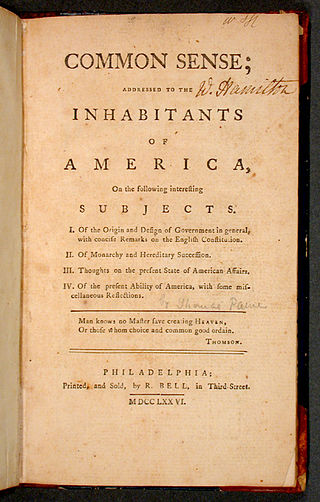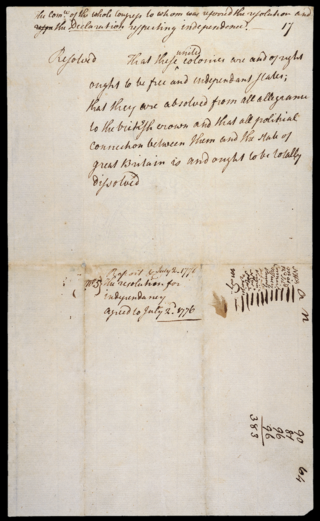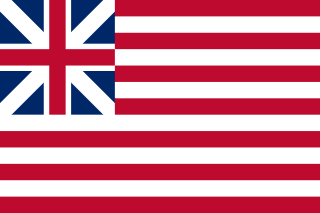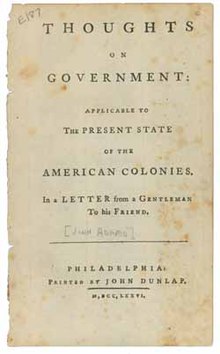
The American Revolution (1765–1783) was an ideological and political movement in the Thirteen Colonies which peaked when colonists initiated the ultimately successful war for independence against the Kingdom of Great Britain. Leaders of the American Revolution were colonial separatist leaders who originally sought more autonomy as British subjects, but later assembled to support the Revolutionary War, which ended British colonial rule over the colonies, establishing their independence as the United States of America in July 1776.
The separation of powers principle functionally differentiates several types of state power and requires these operations of government to be conceptually and institutionally distinguishable and articulated, thereby maintaining the integrity of each. To put this model into practice, government is divided into structurally independent branches to perform various functions. When each function is allocated strictly to one branch, a government is described as having a high degree of separation; whereas, when one person or branch plays a significant part in the exercise of more than one function, this represents a fusion of powers.

The Declaration of Independence, formally titled The unanimous Declaration of the thirteen united States of America in the engrossed version and original printing, is the founding document of the United States. On July 4, 1776, it was adopted unanimously by the 56 delegates to the Second Continental Congress, who convened at Pennsylvania State House, later renamed Independence Hall, in the colonial era capital of Philadelphia. These delegates became known as the nation's Founding Fathers. The Declaration explains why the Thirteen Colonies regarded themselves as independent sovereign states no longer subject to British colonial rule, and has become one of the most circulated, reprinted, and influential documents in history.
The Continental Congress was a series of legislative bodies, with some executive function, for the Thirteen Colonies of Great Britain in North America, and the newly declared United States before, during, and after the American Revolutionary War. The Continental Congress refers to both the First and Second Congresses of 1774–1781 and at the time, also described the Congress of the Confederation of 1781–1789. The Confederation Congress operated as the first federal government until being replaced following ratification of the U.S. Constitution. Until 1785, the Congress met predominantly at what is today Independence Hall in Philadelphia, though it was relocated temporarily on several occasions during the Revolutionary War and the fall of Philadelphia.

Common Sense is a 47-page pamphlet written by Thomas Paine in 1775–1776 advocating independence from Great Britain to people in the Thirteen Colonies. Writing in clear and persuasive prose, Paine collected various moral and political arguments to encourage common people in the Colonies to fight for egalitarian government. It was published anonymously on January 10, 1776, at the beginning of the American Revolution and became an immediate sensation.

The Second Continental Congress (1775–1781) was the meetings of delegates from the Thirteen Colonies that united in support of the American Revolution and the Revolutionary War, which established American independence from the British Empire. The Congress constituted a new federation that it first named the United Colonies of North America, and in 1776, renamed the United States of America. The Congress began convening in Philadelphia, on May 10, 1775, with representatives from 12 of the 13 colonies, after the Battles of Lexington and Concord.

The lieutenant governor of North Carolina is the second-highest elected official in the U.S. state of North Carolina and is the only elected official to have powers in both the legislative and executive branches of state government. A member of the North Carolina Council of State, the lieutenant governor serves a four-year term with a two consecutive term limit. The current lieutenant governor is Rachel Hunt, a Democrat, who has held the office since 2025. The Constitution of North Carolina designates the lieutenant governor the ex officio president of the State Senate and a member of the State Board of Education. They are also required to serve as acting governor of the state in the event of the governor's absence, and assume the governorship in the event it becomes vacant.

The Founding Fathers of the United States, often simply referred to as the Founding Fathers or the Founders, were a group of late-18th-century American revolutionary leaders who united the Thirteen Colonies, oversaw the War of Independence from Great Britain, established the United States of America, and crafted a framework of government for the new nation.

The Lee Resolution, also known as "The Resolution for Independence", was the formal assertion passed by the Second Continental Congress on July 2, 1776, resolving that the Thirteen Colonies were "free and independent States" and separate from the British Empire. This created what became the United States of America, and news of the act was published that evening in The Pennsylvania Evening Post and the following day in The Pennsylvania Gazette. The Declaration of Independence, which officially announced and explained the case for independence, was approved two days later, on July 4, 1776.

The Massachusetts Circular Letter was a statement written by Samuel Adams and James Otis Jr., and passed by the Massachusetts House of Representatives in February 1768 in response to the Townshend Acts. Reactions to the letter brought heightened tensions between the British Parliament and Massachusetts, and resulted in the military occupation of Boston by the British Army, which contributed to the coming of the American Revolution.

The United Colonies of North-America was the official name as used by the Second Continental Congress in Philadelphia for the newly formed proto-state comprising the Thirteen Colonies in 1775 and 1776, before and as independence was declared. Continental currency banknotes displayed the name 'The United Colonies' from May 1775 until February 1777, and the name was being used to refer to the colonies as a whole before the Second Congress met.

The North Carolina Provincial Congress was an extralegal representative assembly patterned after the colonial lower house that existed in North Carolina from 1774 to 1776. It led the transition from British provincial to U.S. state government in North Carolina. It established a revolutionary government, issued bills of credit to finance the provincial government, provided for the common defense, and adopted the state's first constitution.
The Provincial Congresses were extra-legal legislative bodies established in ten of the Thirteen Colonies early in the American Revolution. Some were referred to as congresses while others used different terms for a similar type body. These bodies were generally renamed or replaced with other bodies when the provinces declared themselves states.

Judicial review is a process under which a government's executive, legislative, or administrative actions are subject to review by the judiciary. In a judicial review, a court may invalidate laws, acts, or governmental actions that are incompatible with a higher authority. For example, an executive decision may be invalidated for being unlawful, or a statute may be invalidated for violating the terms of a constitution. Judicial review is one of the checks and balances in the separation of powers—the power of the judiciary to supervise the legislative and executive branches when the latter exceed their authority. The doctrine varies between jurisdictions, so the procedure and scope of judicial review may differ between and within countries.

1776 is celebrated in the United States as the official beginning of the nation, with the Declaration of Independence of the Thirteen Colonies from the British Empire issued on July 4.
Ward republic is a concept promoted by Thomas Jefferson to place most of the functions of government in the ward, a small subdivision of a county. Jefferson thought of this concept as his favorite: "The article nearest my heart," wrote Jefferson to Samuel Kercheval in 1816, "is the division of counties into wards". His proposal was that such wards consist of no more people than can all know one another and personally perform the functions of government for one another. Although his proposal was not generally adopted, there have been partial implementations of the idea in small townships, school districts, voting precincts, and neighborhood associations.
The law of North Carolina consists of several levels, including constitutional, statutory, regulatory, case law, and local law.

The 27 grievances is a section from the United States Declaration of Independence. The Second Continental Congress's Committee of Five drafted the document listing their grievances with the actions and decisions of King George III with regard to the colonies in North America. The Second Continental Congress voted unanimously to adopt and issue the Declaration of Independence on July 4, 1776.
The Augusta Declaration, or the Memorial of Augusta County Committee, May 10, 1776, was a statement presented to the Fifth Virginia Convention in Williamsburg, Virginia on May 10, 1776. The Declaration announced the necessity of the Thirteen Colonies to form a permanent and independent union of states and national government separate from Great Britain, with whom the Colonies were at war.

A Defence of the Constitutions of Government of the United States of America is a three-volume work by John Adams, written between 1787 and 1788. The text was Adams’ response to criticisms of the proposed American government, particularly those made by French economist and political theorist Anne Robert Jacques Turgot, who had argued against bicameralism and separation of powers.











